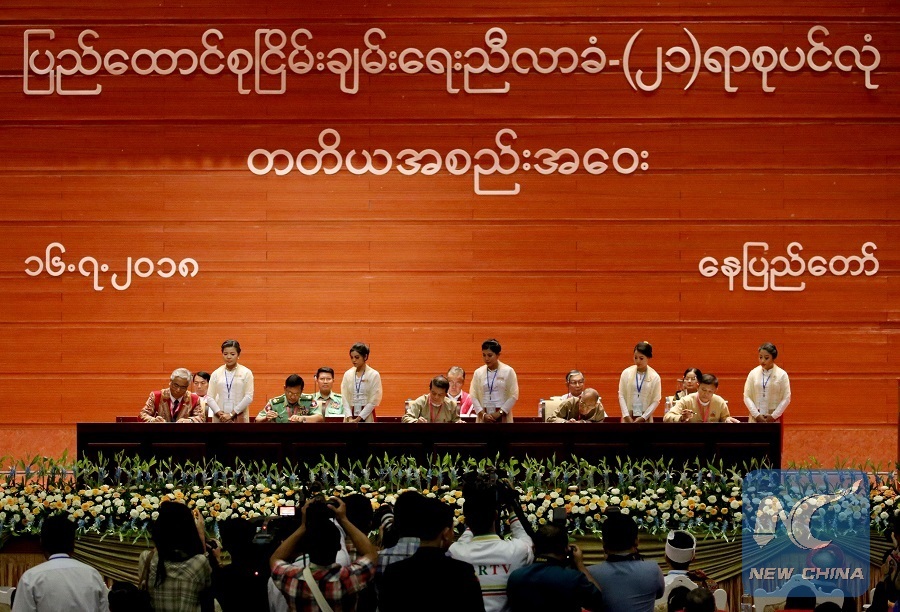
Representatives sign on document during the third session of the 21st Century Panglong Peace Conference at the Myanmar International Convention Centre in Nay Pyi Taw, Myanmar, July 16, 2018. (Xinhua/Haymhan Aung)
NAY PYI TAW, July 16 (Xinhua) -- Myanmar State Counselor Aung San Suu Kyi on Monday called for the next move to complete a Union Accord for Peace following the adoption of more basic principles as part of the union pact.
The signing of 14 more basic principles is designed for a new step towards winning more results for peace, she said in her closing remarks at the third session of the 21st Century Panglong Peace Conference in Nay Pyi Taw.
Suu Kyi expressed delight over the good results obtained in the peace process, citing separate meetings between the government and non-signatory armed groups to the National Ceasefire Accord (NCA) as a sign of goodwill.
She called for marching forward unitedly with a goal of peace.
At the end of the Panglong conference, a statement was issued in which representatives pledged to set more fundamental principles for establishing a democratic and federal union by holding another session later this year and two more in 2019.
The third session of Myanmar's 21st Century Panglong Peace Conference, which began on Wednesday, concluded in Nay Pyi Taw on Monday with 14 more basic principles adopted as part of the Union Accord for Peace.
The agreed principles in accordance with the NCA were signed by leaders of participant groups of the government, parliament, military, ceasefired ethnic armed groups and political parties.
Ten ethnic armed groups already signing the NCA attended the conference, while seven other non-signatory groups of the Northern Alliance, which were invited to the meeting, vowed to continue the peace process with the government.
Of the basic principles, proposed by the Union Peace Dialogue Joint Committee (UPDJC) for establishing a democratic and federal union, four are related to political, one to economic, seven to social and two to land and environmental issues.
The four political-related basic principles highlight gender equality, inclusion of at least 30 percent by women in each sector, prevention of violence against women and raising of women's capacity.
The one economic-related basic principle calls for rights for regional or state governments to devise and implement economic development policy and projects of their own as a priority for the interest of their regional people without impacting on other regions or states.
The seven social-related basic principles include implementation of all-inclusive education system, universal health coverage, enactment of laws that guarantee women's rights and harm reduction for drug addicts.
The two land and environmental-related basic principles deal with the requirements that land in the country belongs to local citizens only and shall not be owned by foreigners directly or indirectly, and pre-assessment shall be made in terms of environmental, social and health impact as well as coordination with local people before implementing projects using land.
The 14 basic principles adopted in the third session brought the total number incorporated into the Union Accord for Peace to 51.
The second session of the conference held in May 2017 approved an initial of 37 basic principles for establishing federalism under the NCA.

